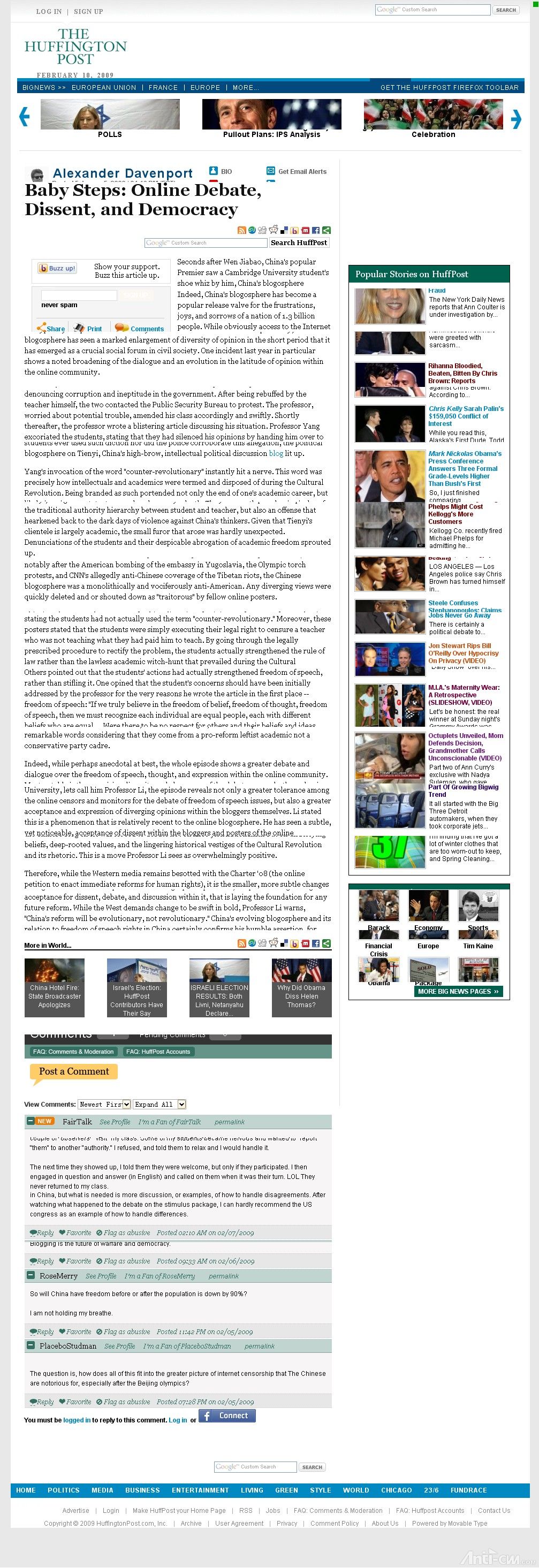|
|
本帖最后由 jenco 于 2009-2-11 10:38 编辑
http://www.huffingtonpost.com/al ... ebate_b_164136.html
Secondsafter Wen Jiabao, China's popular Premier saw a Cambridge Universitystudent's shoe whiz by him, China's blogosphere exploded with opinions.
Indeed, China's blogosphere has become a popular release valve forthe frustrations, joys, and sorrows of a nation of 1.3 billion people.While obviously access to the Internet in China does not perfectlymirror the nation as a whole, Chinese blogs provide a unique andanonymous forum for discussing topics that are typically swept underthe table by the state-run media. But more importantly, China'sblogosphere has seen a marked enlargement of diversity of opinion inthe short period that it has emerged as a crucial social forum in civilsociety. One incident last year in particular shows a noted broadeningof the dialogue and an evolution in the latitude of opinion within theonline community.
In late November 2008, two female students of Shanghai's East ChinaLaw and Politics University became frustrated that their classicalChinese professor spent class time denouncing corruption and ineptitudein the government. After being rebuffed by the teacher himself, the twocontacted the Public Security Bureau to protest. The professor, worriedabout potential trouble, amended his class accordingly and swiftly.Shortly thereafter, the professor wrote a blistering article discussinghis situation. Professor Yang excoriated the students, stating thatthey had silenced his opinions by handing him over to the police as a"counter-revolutionary." Although the professor never proved that thestudents ever used such diction nor did the police corroborate thisallegation, the political blogosphere on Tienyi, China's high-brow,intellectual political discussion blog lit up.
Yang's invocation of the word "counter-revolutionary" instantly hita nerve. This word was precisely how intellectuals and academics weretermed and disposed of during the Cultural Revolution. Being branded assuch portended not only the end of one's academic career, but likelyimprisonment, torture, and perhaps even death. Thus, among the academiccircles of Tienyi, being termed a "counter-revolutionary" was not onlyan unacceptable usurpation of the traditional authority hierarchybetween student and teacher, but also an offense that hearkened back tothe dark days of violence against China's thinkers. Given that Tienyi'sclientele is largely academic, the small furor that arose was hardlyunexpected. Denunciations of the students and their despicableabrogation of academic freedom sprouted up.
But this incident showed a marked departure from previous onlinetempests. Before, most notably after the American bombing of theembassy in Yugoslavia, the Olympic torch protests, and CNN's allegedlyanti-Chinese coverage of the Tibetan riots, the Chinese blogosphere wasa monolithically and vociferously anti-American. Any diverging viewswere quickly deleted and or shouted down as "traitorous" by fellowonline posters.
This time, however, there was a refreshing diversity of opinion. Infact, not a few academics that stood up in support of the students.They pushed back at Professor Yang's allegations, stating the studentshad not actually used the term "counter-revolutionary." Moreover, theseposters stated that the students were simply executing their legalright to censure a teacher who was not teaching what they had paid himto teach. By going through the legally prescribed procedure to rectifythe problem, the students actually strengthened the rule of law ratherthan the lawless academic witch-hunt that prevailed during the CulturalRevolution (that Yang had so clearly invoked to gain rhetoricalappeal).
Others pointed out that the students' actions had actuallystrengthened freedom of speech, rather than stifling it. One opinedthat the student's concerns should have been initially addressed by theprofessor for the very reasons he wrote the article in the first place-- freedom of speech: "If we truly believe in the freedom of belief,freedom of thought, freedom of speech, then we must recognize eachindividual are equal people, each with different beliefs who are equal... Were there to be no respect for others and their beliefs and ideas,there could be no freedom of belief, freedom of thought, freedom ofspeech." Truly remarkable words considering that they come from apro-reform leftist academic not a conservative party cadre.
Indeed, while perhaps anecdotal at best, the whole episode shows agreater debate and dialogue over the freedom of speech, thought, andexpression within the online community. Most notable is the surprisingdiversity and eloquence of the debate among both academics and regularvisitors alike. According to a respected socio-linguistics professor atFudan University, lets call him Professor Li, the episode reveals notonly a greater tolerance among the online censors and monitors for thedebate of freedom of speech issues, but also a greater acceptance andexpression of diverging opinions within the bloggers themselves. Listated this is a phenomenon that is relatively recent to the onlineblogosphere. He has seen a subtle, yet noticeable, acceptance ofdissent within the bloggers and posters of the online community. Inthis case, helped likely by the absence of a scapegoat (a la the UnitedStates), the Chinese blog circle was forced to debate not on knee-jerknationalism but on underlying beliefs, deep-rooted values, and thelingering historical vestiges of the Cultural Revolution and itsrhetoric. This is a move Professor Li sees as overwhelmingly positive.
Therefore, while the Western media remains besotted with the Charter'08 (the online petition to enact immediate reforms for human rights),it is the smaller, more subtle changes that are actually alteringChina's embrace of such liberties. Indeed, it is this curiousenlargement of the social sphere that the blogosphere provides, coupledwith a growing acceptance for dissent, debate, and discussion withinit, that is laying the foundation for any future reform. While the Westdemands change to be swift in bold, Professor Li warns, "China's reformwill be evolutionary, not revolutionary." China's evolving blogosphereand its relation to freedom of speech rights in China certainlyconfirms his humble assertion, for now at least.
星岛的摘译:
在中国温家宝总理在剑桥大学遭遇扔鞋事件数秒钟后,中国的互联网空间就发生了意见的大爆发。
事实上,中国的互联网空间已经变成13亿人释放挫折与欢乐的阀门。尽管网上的种种无法完美地体现这个国家的全部,但为话题的讨论提供了一个独特的匿名的论坛。更为重要的是,中国的网络空间在崛起成为民间社会重要社会论坛的短短时间内,就见证了意见多元化的显着扩大。去年的一起事件特别能够展现对话的拓宽,以及在线社区意见纬度的演变。
在2008年11月末,上海华东政法大学的两名女学生对教授在课堂时间针砭时弊的言论感到失望,在遭到教授的回绝后,两人与公安局联系,指教授是“反革命”。不久后,这位教授写了一篇文章讨论这个情况。这篇文章引发网络热议。
教授援引的“反革命”一词立即挑动人们的神经,令人想起以暴力对待中国思想家的黑暗岁月,因此引起愤怒也是可以预料到事情。
不过此事跟之前的网上骚动很不一样。此前,特别是在美国轰炸中国驻南斯拉夫大使馆、奥运火炬示威、CNN对西藏事件的所谓反华报道之后,中国互联网空间基本上是铁板一块,高声反美。其他声音被迅速删除或者被斥为“叛徒”。
然而,这一次却是令人精神一振的意见多元化。事实上,不少学者支持那两位学生的行为。他们驳斥那位教授的陈述,宣称学生们实际上并没有使用“反革命”这个词。此外,有网友指出,这些学生只是运用自己的合法权利去指责一位并没有传授他们付钱来学的内容的老师。通过法律程序来矫正这个问题,学生实际上是强化法治,而不是像文革期间那样无法无天地迫害知识分子。
也有人指出学生们的行动实际上是强化而不是削弱言论自由。事实上,整个事件展现了互联网社区对自由言论、思想和表达的大讨论和对话。最令人瞩目是的学者与访客当中惊人的多元化和雄辩。据复旦大学一位受人尊敬的社会语言教授(我们可以称之为李教授(ProfessorLi))所说,事件不仅表明互联网审查变得更加宽容,而且反映网民变得更加接受和表达多元化的意见。李教授认为这是已经最近兴起的现象。他见证了网友接受异见程度微妙而引人注目的变化。这一次,可能是因为缺少替罪羊(例如美国),中国互联网空间的讨论无法以膝跳反应的民族主义为依据,被迫以潜在的信念、深层次价值观、以及对文革及文革论调挥之不去的历史记忆为讨论基础。
因此,尽管西方媒体仍然沉醉于呼吁立即改革,但中国实际上正发生步调较小,较为微妙的变化。事实上,互联网所拓展的社会空间,加上当中对异见、辩论和讨论的日益接受,正为未来的任何改革奠定基础。(作者:Alexander Davenport;原标题婴儿学步:在线讨论、不同意见和民主) |
-

|